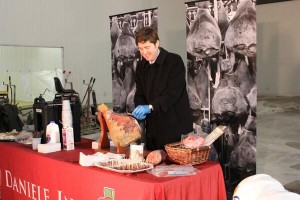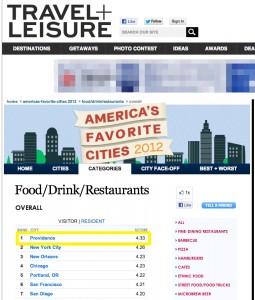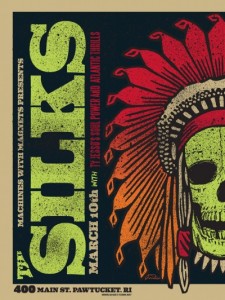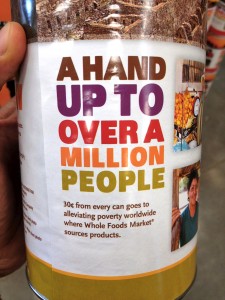
Next to our beautiful beaches, Rhode Island is best-known nationally for our left-leaning congressional delegation and the amazing food we have here.
And all week long, Congressman Jim Langevin is bringing these two reputation-boosting attributes together as he visits some of the most innovative, entrepreneurial, economy-boosting and just plain delicious businesses in the Ocean State.
Langevin will visit one of the largest distributors of organic produce in the nation as well as one of the biggest distributors of frozen fish. He sample world-renowned cured meats and shop at an upstart local grocery chain that’s causing its bigger national competitors to rethink their business models. He’ll eat at some of the best restaurants in New England and visit some of the the hippest markets and most beautiful farms found anywhere.
All without ever leaving Rhode Island.
He kicked off his week-long food tour yesterday at Daniele, Inc in Northern Rhode Island. The average Rhode Islander may not know this Burrillville-based business, but purveyors of the finest prosciutto worldwide know the brand well (as should anyone who enjoys a high-quality, authentic Italian Grinder).
And Daniele owner Davide Dukcevich, who was Langevin’s guest at the State of the Union this year, may have given the congressman an idea that could prove to be the key to fixing Rhode Island’s economy.
Dukcevich, Langevin said, approached him, “about the possibility of branding Rhode Island as the ‘Silicon Valley of food.'”
“That concept resonated with me,” Langevin continued, “and I believe that the business savvy, enthusiasm and determination of individuals like Davide can make that idea a reality.”
Betasprings founder Allan Tear agreed.
“Rhode Island has all the right ingredients to be the center of culinary innovation in the U.S.,” he said. “New food and beverage startups are joining our existing packaged food businesses in bringing their products to New England, the US, and the world. These food innovators create the kind of jobs that matter for Rhode Island.”
You can follow Langevin’s food tour of Rhode Island on Twitter or Instagram with the hashtag: #RIFoodWeek.
Or you can let us follow it for you on this Storify we’ll update throughout the week:
]]>
Recently, Johnson & Wales University President Mim Runey shared with the Providence Journal the university’s efforts to help grow the city’s thriving food cluster. She highlighted a few stats that show how RI’s food cluster has grown over the last decade, contributing to the local economy:
- Industries involved in “purchased meals and beverages” grew from $1.6 billion to just under $1.8 billion.
- Industries in “accommodations” grew from $286 million to $416 million.
- Jobs in food services and drinking places grew by 10 percent.
- Jobs in accommodations grew by more than 8 percent.
- Jobs in food and food-related occupations grew by 9.3 percent.
I was fortunate enough to be on the project team when the Initiative for a Competitive Inner City and Next Street worked with JWU leadership as JWU thought strategically about how to better position itself as a key leader in the food cluster. JWU is exploring innovative opportunities in all business components of the cluster, including marketing, entrepreneurship and new business development. While JWU continues to be a key contributor to Providence’s food cluster growth, there are also many other reasons why Providence can (and should) be a leader in food.
Providence’s food renaissance began emerging over many years, beginning with the proliferation of community farms and farmer’s markets across the state. Not unlike many regions of the country, consumers in Rhode Island became increasingly conscientious of healthy food and sustainable agriculture. While the Southside Community Land Trust began in 1981, demand for local and organic food grew in earnest throughout the late 1990s and early 2000s. Farm Fresh RI was created in 2004 to support the local food system by building capacity along the entire food value chain: producers, markets, and consumers. Today, the state ranks as one of the highest for direct sales specifically because of the success of the many farmers markets, stands, and CSAs. There are over 600 farms in Rhode Island, and at least one farmers market in every town. The system of farmers markets in the state has driven over 40% of the growth in the agricultural economy over the last 10 years. Many JWU faculty and alumni are known for using locally-sourced ingredients for classroom instruction and at RI restaurants owned and operated by JWU culinary experts.
In no small part, the advocacy and leadership of the RI Food Policy Council was a boon for local farmers, including the Rhode Island Food Assessment, “a comprehensive resource for stakeholders throughout the state who are working to strengthen the Rhode Island food system … [to] move food from Rhode Island farms and fisheries to consumers in all Rhode Island communities.” The Council focuses on increasing access to local healthy food, increasing the production of and demand for local food, promoting sustainability, and generating equitable economic opportunities for all Rhode Islanders. Additionally, the Rhode Island Agricultural Partnership’s 5-year strategic plan is aligning the efforts of the state’s agricultural producers and creating a single vision for agriculture in Rhode Island.
But the food cluster is more than community gardens and farmers markets. Providence has also developed a very dense food truck scene over the past 4 or 5 years. It can be argued that Providence started the mobile food trend when Walter Scott created the first horse-drawn diner wagon in 1872. The Haven Brothers Diner has had its perch next to Providence’s city hall since the 1950s. More recently, dozens of new food trucks have popped up offering an assortment of foodstuffs that is dizzying: wood-fired pizza, Korean BBQ, grilled cheese sandwiches, tacos, mac ‘n cheese, pulled pork, pudding pops, and cupcakes to name only a few. The expansion of mobile food choices is providing food entrepreneurs opportunities to enter the food business with minimal capital costs.
Additionally, the entire food distribution system is changing with the recent creation of Market Mobile, an online ordering and delivery system that connects farms to restaurants, grocers, schools and hospitals around Providence, Newport, Westerly and the Boston metro area. In 2012, family farmers and producers sold $1.5 million of local food through Market Mobile, a 50% increase from 2011.
The Farm to School initiative fosters healthy eating habits in children and every public school district in the state participates to some degree. In the 2011-2012 school year, the state’s public schools spent $175,000 on food from RI farmers, about 250,000 pounds of locally-grown produce and milk. In 2013, Farm to School is expanding its reach to connect farmers with pre-K, private schools, colleges, and hospitals. One challenge to scaling these programs is the distribution channels of the food service companies that currently service institutions in the state. School districts, however, can and should increase local procurement requirements upon renewal of food service contracts.
Additional innovations in the food cluster are on the horizon, including a permanent, year-round Public Market in Providence that will include a wholesale aggregation and distribution center, public kitchen space, a kitchen incubator, and a nutrition classroom. There is an enormous shared value opportunity for JWU to support and benefit from this endeavor and creating innovative new pathways for JWU graduates.
Johnson & Wales University and its Culinary Arts program is a strong key player in Providence’s growing food cluster, enmeshed in an ecosystem that supports and reinforces it in innumerable ways. Rhode Island has a history of marine research driven by the University of Rhode Island and leads the nation in shellfish farming innovation and sustainable fishing. In June, the Sustainable Agriculture and Food Systems Funders held its 2013 Annual Forum in Providence, and last month the 2013 Ronald C. Baird Sea Grant Science Symposium was hosted in Warwick, at which “The Future of Shellfish in Rhode Island” was presented. Innovation in food production and distribution is a critical element for the food cluster and can strengthen Providence’s competitive advantage.
JWU is embracing its own strategic commitment to blend the culinary arts with science through the JWU / Tulane University School of Medicine’s culinary medicine collaboration. This is the first time a medical school and a major culinary institution will partner to develop joint curriculum for doctors, medical students, chefs and the community about the significant health role that food choices and nutrition play in preventing and managing obesity and associated diseases in America. Other university stakeholders include Nutrition and Food Sciences at the University of Rhode Island, Packaging, Illustration, andIndustrial Design at the Rhode Island School of Design, and Innovation Management and Entrepreneurship and Medicine at Brown University.
Providence is also the home of United Natural Food Inc., the nation’s largest distributor of organic and natural foods, innovative high-growth companies likeEdesia, selling nutritious ready-to-use foods to treat malnutrition in 35 countries around the world, and food-related social ventures like Amos House’s Culinary Education Program and Friendship Café and RallyRI, an organization focused on create startup businesses in four economic sectors including food.
The food cluster is supported by organizations such as Eat Drink RI which shares information about the state’s food community and RI Food Fights, a hosting of light-hearted public culinary competitions in various categories. Lastly, Edible Rhody tells the stories of the state’s farmers, chefs, fishers and food and beverage artisans who work and live in Rhode Island.
Providence does food right! And this is why Providence was named as host city for the very first Taste Trekkers food tourism conference held on September 20-22. Moreover, many of the accolades for the nation’s best food that are awarded to Providence are due to the culinary expertise and entrepreneurism of JWU graduates. JWU is a strong reason why Providence’s food cluster has been growing while the rest of the state economy flounders.
]]> There’s a show tonight at Machines with Magnets that I won’t be going to, but it will be King Hell awesome. I think The Silks are one of the best acts on wheels right now, even though I’m not really a roots music kind of guy.
There’s a show tonight at Machines with Magnets that I won’t be going to, but it will be King Hell awesome. I think The Silks are one of the best acts on wheels right now, even though I’m not really a roots music kind of guy.
Based on the advice of my friend Lord Giovanni, we brought The Silks up to the shop to cap off one of those morale-boosting days, and they positively CRUSHED it. It’s not easy to please true-to-life factory types, ultra-genius engineers and, well, me. But they had 100% of the people smiling. The support card tonight includes The Atlantic Thrills, who will rip your face off and gave up a stellar performance at last year’s Wooly Fair.
The wider music scene in PVD also includes The Rice Cakes clever post-pop, The ‘mericans ‘mericana as well as RI Future’s own Alex Moore’s The Invisible Hours psychedelic pop and Reza Clifton‘s soulful hip-hop to name but a few.
Okay, enough with the name-dropping link bait. You get the point.
Next month will mark my 20th anniversary as a Providencean (with a few years as a Bucketeer), and right now is the best it’s been. I realize that RI features some particularly ugly statistics and that some, even many folks are having a tough time. But for me, this is the most satisfying life experience to date.
Why? It’s the cult-chuh!
Compared to What?
Here’s the thing. It’s not like I moved here from South Carolina or the ‘burbs of VA. I’ve lived in Boulder, CO; San Francisco; Burlington, VT and East Jeezum, VT.
There’s obviously a pattern. I’ve always actively sought a liberal or progressive political culture and an active local arts scene. While I didn’t choose to move to Providence, I choose to stay because I really love it here.
It’s fashionable to bash on Rhode Island, and even I was pushed over the edge by my DMV-ing last week. But these negatives quickly fade away when I have so many stimulating and satisfying options from which to choose. When I hear people beef about RI, I really don’t get it. What do you want out of life, people?
Of course, Providence isn’t for everybody, and to each his or her own. I know that one frequent commenter is quite satisfied with the VA ‘burbs, although another person I know is positively hating it down there and can’t wait to come back. I’ve had family reasons to go to South Carolina many times, but I’m hoping I never have to go there again as long as I live.
To each his or her own. Fair enough.
Three One-of-a-Kind Examples of Awesome
If you’ve never been to a show at Machines with Magnets, you have missed a fabulous and unique experience. (GO TONIGHT!) MwM in Pawtucket is a recording studio, an art gallery and a performance space. And all the parts are strong. They’ve recorded both Battles records, local heros Deer Tick and a lot of other highly demanding artists. To call the shows in the gallery/performance space “intimate” does not express the immediacy of the experience. It is at once world-class, entirely approachable and actively supportive of the local scene. Where else can you cite that’s like that?
Wooly Fair, of which I am a part, is head and shoulders above any arts event I’ve ever been to. What makes Wooly so amazing is the complete and utter lack of support from anybody who’s not an artist or creative of some sort. There’s practically no corporate or civic sponsorship, and to date, it’s been almost entirely volunteer-driven. That leaves us free to create what no highly sponsored event can – total madness.
Lastly, Thee Red Fez is my favorite restaurant anywhere. Well, Bazaar in Amsterdam gives it a run for its money. It may be the ultimate expression of Providence-ness. Founded by a (married) couple of punks, it makes eclectic seem boring. The vibe is young and lively, and the menu is constantly changing with a focus on local ingredients. Chef Ed Raposa is a food genius. Breaded, deep-fried kim chee. Quod erat demonstrum. I’ve taken numerous clients there, and one – a true world traveler – paid it the ultimate compliment of photographing the menu and sending it to a friend as part of their ongoing best-menus game called “Where Am I?” None of the three guesses was “Providence”, and the revealed answer was met with complete incredulity.
This posting of some dozen-odd examples only scratches the surface of the outrageously rich cultural life that makes Providence such a great place to live. In conclusion, I like it here.
]]>
While shopping at Whole Foods last week (yeah, I do that often #smirking) I came across a new Whole Foods brand coffee. It was arranged in a pyramid styled display, and the store rep., having just completed the task of assembling it, stood nearby staring on with a look so proud it bordered on the supercilious.
I stepped closer to observe that the coffee was being shipped in from all around the world: Latin America, East Africa, India blends. Of course this is nothing new, we always bring in goods from places we’ve either colonized or helped facilitated the colonization of (think Vietnam). But what struck me most was what I read on the side of the container: “A hand up to over a million people. 30¢ from every can goes to alleviating poverty worldwide where Whole Foods Market sources products.”
Hmmm… “A hand up,” “alleviating poverty worldwide.” Really?
There are two immediate ways in which I might problematize the crisis in Western altruistic thought — and the capitalist work of Whole Foods in this endeavor:
First, it positions us, as Westerners who live in and with a “First World” perception, to imagine that essential poverty can be alleviated by 30¢. And what a bargain that is! In fact, it’s a 2 for 1 special, because not only can one purchase a can of fresh, organic, fairly traded coffee, but one can also purchase one’s redemption from having to think or be concerned about the constructed impoverished conditions of the people who laboriously tend this coffee on land they don’t own, or even control. One need not expend cognitive energy contemplating the worker’s labor conditions, which are likely politically influenced by social and economic mandates from one’s own First World government; just 30¢ and it all goes away.
Pardon me a moment while I run to my bookshelf, grab my bible and reread the parable of the Good Samaritan:
[Luke 10: 30-37]
29But he, willing to justify himself, said unto Jesus, And who is my neighbour?
30And Jesus answering said, A certain man went down from Jerusalem to Jericho, and fell among thieves, which stripped him of his raiment, and wounded him, and departed, leaving him half dead.
31And by chance there came down a certain priest that way: and when he saw him, he passed by on the other side.
32And likewise a Levite, when he was at the place, came and looked on him, and passed by on the other side.
33But a certain Samaritan, as he journeyed, came where he was: and when he saw him, he had compassion on him,
34And went to him, and bound up his wounds, pouring in oil and wine, and set him on his own beast, and brought him to an inn, and took care of him.
35And on the morrow when he departed, he took out two pence, and gave them to the host, and said unto him, Take care of him; and whatsoever thou spendest more, when I come again, I will repay thee.
36Which now of these three, thinkest thou, was neighbour unto him that fell among the thieves?
37And he said, He that shewed mercy on him. Then said Jesus unto him, Go, and do thou likewise. [KJV]
The marketing formation of this coffee creates a way for western consumers to escape critiques of capitalism. Rather than fundamentally question this economic monolith, we choose, instead, to tolerate it; and Whole Foods makes it a benign affair. In many ways that which we call “neocolonialism” is merely the refitting of the old colonialism to a contemporary world and political cultural order. The labor of those othered is still exploited, but said exploitation is somehow in the very same moment alleviated — and that apparently with 30¢.
Real photographs of the women on the side of the can have simply become twenty-first century iconographs of acceptable indigence. Think “Aunt Jamima,” still clothed in her class-status-cueing raiment, still brandishing a smile of contentment, only now she is receiving a so-called fair wage.
Next, when we consider the example of Africa we know that it was a continental European colonial outpost. And we know that the economic corruption and deleterious identity politics were introduced by morally challenged European powers and are sustained by African hegemons. American media and educational structuring silence this past and present in such a way that it is held external to the lived experiences of both Third World laborers and First World consumers. Capitalist frameworks of knowledge exploitation, and our participation in its perpetuation, are obscured by an altruistic desire to purchase our 30¢ redemption from having to care any further about the way in which neocolonialism cashes in on, as Jesus would assert, our neighbor.
Though we think ourselves “Good Samaritans”, in fact we have become political actors, “Levites” and “priests,” at the register in Whole Foods. No coming closer out of compassionate concern, no oil and wine of healing or bandaging of wounds, no picking up from the road side and transporting to the inn, no financing of medical care to nurse back to health; nothing of a sorts. Just 30¢ to alleviate the poverty. Oh, the suffering worker will remain in poverty, no doubt! But it will be somewhat alleviated as the oppressive economic relationship of our’s and our neighbor’s world is authorized by this insidious transaction of misdirection. The irony of the issue at hand is not that we didn’t provide a charitable service, but that we got to walk away imagining that we did. And this is, as Slavoj Zizek would say, “the commodification of suffering,” where the aim is not to end the economic relationship hinged on disparate power, rather it is to maintain it by benevolently prolonging it as though one were giving alms.
“The proper aim is to try and reconstruct society on such a basis that poverty will be impossible.” -Zizek
]]>